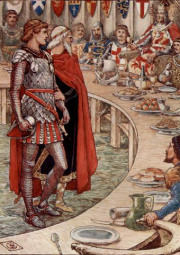|
Home
|
Sep 6, 2021
This week’s themeEponyms This week’s words galahad baedeker zephyr janus-faced ritz 
Sir Galahad is brought to the court of King Arthur
Illustration: Walter Crane, in King Arthur’s Knights: The Tales Retold for Boys and Girls, 1911 Previous week’s theme Words with unusual pronunciations A.Word.A.Day
with Anu GargImagine you met someone named, say Johnson, in your personal, social, or professional life. Johnson loved to point out errors in spelling or grammar. But that’s not the reason he stood out for you. Rather, while pointing out the error, he made an error himself. Since then, whenever you meet a person who makes an error while pointing out another’s error, you might say they were being Johnsonian. That’s an example of an eponym, a word coined after a person, from Greek epi- (upon) + -onym (name). Hundreds of words in the English language are coined after people who stand out, for reasons noble or not so noble. We’ll feature five such words this week, coined after people real and fictional. What eponyms do you have to share from your life. Post them below or email us at words@wordsmith.org. Share instances from your own life, not something you read somewhere. In our quest to meet these eponyms from legend, mythology, and real life we’ll travel to England, Germany, Greece, Rome, and Switzerland. Galahad
PRONUNCIATION:
MEANING:
noun: One who is known for integrity, courteousness, and nobility.
ETYMOLOGY:
After Sir Galahad, the noblest of the Knights of the Round Table, in
the British legend of King Arthur. Earliest documented use: 1854.
USAGE:
“I’m not a Galahad. I’m a bully, too.” Max Phillips; Fade to Blonde; Hard Case Crime; 2004. See more usage examples of Galahad in Vocabulary.com’s dictionary. A THOUGHT FOR TODAY:
When people are fanatically dedicated to political or religious faiths or
any other kind of dogmas or goals, it's always because these dogmas or
goals are in doubt. -Robert M. Pirsig, author and philosopher (6 Sep
1928-2017)
|
|
Subscriber Services
Awards | Stats | Links | Privacy Policy
Contribute | Advertise
Awards | Stats | Links | Privacy Policy
Contribute | Advertise
© 1994-2026 Wordsmith